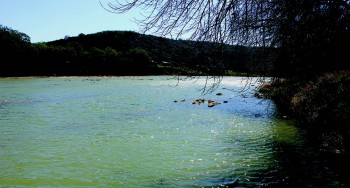Sharing Water with Mussels
October 23, 2015

Surface & Hydrologic Processes
Texas water supplies, often stressed by drought, could be further affected by the federal listing of five freshwater mussel species under the Endangered Species Act, but most of the potential impacts could be mitigated by innovative water strategies, according to a study by the Bureau of Economic Geology (BEG).
The study in the October 2014 edition of the Journal of the American Water Resources Association addresses an issue that has concerned water managers in drought-prone Texas since 2011, the year when the U.S. Fish and Wildlife Service determined that five species of mussels warranted protection under the federal Endangered Species Act.
The five species – Texas fatmucket, Texas pimpleback, golden orb, Texas fawnsfoot and smooth pimpleback – have not been listed as endangered yet. If the species were listed and critical habitat designated, the federal law could affect environmental flows (water flows required to sustain freshwater ecosystems) in certain streams and rivers, especially in Central Texas, where the most mussels are found.
“Modeled changes in water availability following possible federal listing of the mussels are minimal when we are not in a drought,” said lead author Brad Wolaver, a BEG research associate.
But during times of drought, disruptions to water supply could be significant in areas that already have shortages. They include: Bexar County, particularly in San Antonio’s power generation sector; Tom Green County, where San Angelo has long-standing supply issues; and Wharton County, where existing agricultural water supply issues could be exacerbated.
Back to the Newsletter